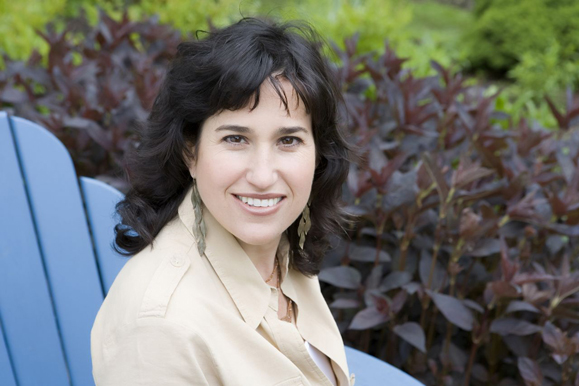Chicagoan Jeanne Nolan talks to Kara Rota about her new book and her commitment to growing organic food.
“I am all about people growing their own food,” Jeanne Nolan says to me when we get on the phone to discuss her just-released book, From the Ground Up: A Food Grower’s Education in Life, Love and the Movement That’s Changing the Nation. When we met nine years ago, Jeanne had just moved from a communal farm back to her parents’ house in a gated community on the North Shore of Chicago. That year, I watched her turn her unconventional experience in growing food into the business of patiently, kindly, and relentlessly teaching organic vegetable gardening to everyone who would listen, starting with suburbanites whose perfectly manicured Miracle-Gro cookie-cutter lawns would never be the same.
“My message is that anyone, anywhere can grow food,” Jeanne continues. “That may mean, for somebody, a few pots of herbs on a fire escape. That may mean renting a community garden plot. That may mean starting to compost with a worm bin in your apartment. There’s something about the lifestyle change that happens when you get involved in growing something you’re going to eat that is, I think, for some people, a gateway or a first step into being able to examine other aspects of their life where they may want to make changes.”
As a teenager, Jeanne dropped out of her demanding and affluent high school on Chicago’s North Shore where she excelled academically but felt that there was something seriously lacking. Yearning for a whole and less materialistic life, she moved to Zendik Farm, a commune in rural California that practiced organic farming. Seventeen years later, the extreme and unreasonable restrictions on members’ personal lives, including romantic relationships and child-rearing, led Jeanne to escape the commune and go back to her childhood home, bringing her then-two-year-old daughter with her. Awash in culture shock and unsure how to build an adult life in the community she had renounced, Jeanne began doing the only thing she felt she knew how to do: grow food. First in her parents’ backyard, then for neighbors. Before long, she capitalized on her skill to found The Organic Gardener Ltd. and had a contract to create the Lincoln Park Zoo’s Edible Garden. Since then, she’s helped countless families, schools, organizations and companies grow their own food organically.
“People are really getting it that we have to change our ways,” Jeanne says. “I interact with a lot of moms, and more and more parents are making the connection. Of course you want your kids to eat fresh and healthy food. Kids who grow vegetables, either at school or at home, eat more vegetables – there’s a lot of data now backing that. But parents who have kids who have challenges like focus issues, ADHD, ADD, even more severe issues, or physical health issues – I’ve talked to so many moms who are turning to food and making sure that their kids are eating less processed food, less sugar, and really finding that that is a way they can help their kids with these mental or physical health issues.”
Kids have become powerful advocates in what Jeanne calls the “seed to table” movement. In Chicago public schools, Jeanne trains teachers in using the vegetable gardens as teaching tools. “Particularly in underserved areas, food desert locations, a lot of the vegetables that kids are growing at school they’re not used to eating at home. Kids will harvest carrots, maybe even rainbow carrots, and they come home like, ‘Mom, we’ve gotta get carrots! We can get them in all different colors!’ A lot of kids are pushing the envelope at home. When they come to our garden in Lincoln Park Zoo, we’ve got tomatoes that are gold and they’re so sweet, and kids who’ve never liked tomatoes try them and love them. And then they want them. There are a lot of kids who are leading the charge with their parents to eat better… With some children it’s a real match, the activity of growing food. It just captivates them.”
Most of all, Jeanne insists that this movement is for everyone, and that it affects all of us. “Growing your own food, shopping at farmers markets, wanting to know where your food comes from, wanting to be involved in the process, wanting schools to provide better food, wanting schools to provide gardening programs, urban farming, it’s all in there. The awareness of it is cross-cultural. Inner city kids who live in food deserts need better food at their schools and community gardens, and affluent kids who have everything but have no idea where it comes from, no sense of connection with the earth…they need it just as much. The benefit of growing our own food, of getting in on this conversation, is there for everybody. In cities, in suburbs, rurally, the message is relevant…It’s part of being human. To use your muscles, moving a wheelbarrow, digging, planting. I think it’s in us, the need to interact with the earth that way.”


Leave a Reply